Pinxue Zhao
HMoE: Heterogeneous Mixture of Experts for Language Modeling
Aug 20, 2024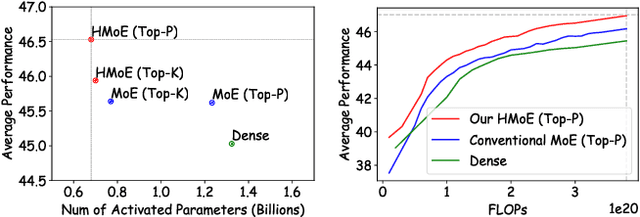



Abstract:Mixture of Experts (MoE) offers remarkable performance and computational efficiency by selectively activating subsets of model parameters. Traditionally, MoE models use homogeneous experts, each with identical capacity. However, varying complexity in input data necessitates experts with diverse capabilities, while homogeneous MoE hinders effective expert specialization and efficient parameter utilization. In this study, we propose a novel Heterogeneous Mixture of Experts (HMoE), where experts differ in size and thus possess diverse capacities. This heterogeneity allows for more specialized experts to handle varying token complexities more effectively. To address the imbalance in expert activation, we propose a novel training objective that encourages the frequent activation of smaller experts, enhancing computational efficiency and parameter utilization. Extensive experiments demonstrate that HMoE achieves lower loss with fewer activated parameters and outperforms conventional homogeneous MoE models on various pre-training evaluation benchmarks. Codes will be released upon acceptance.
Efficiently Training 7B LLM with 1 Million Sequence Length on 8 GPUs
Jul 16, 2024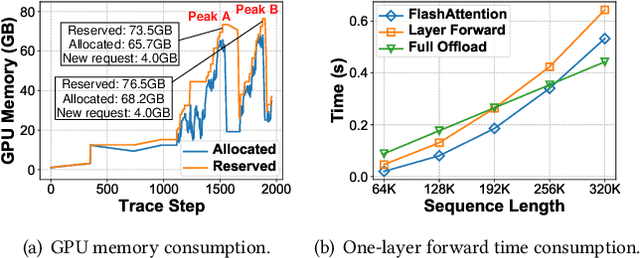
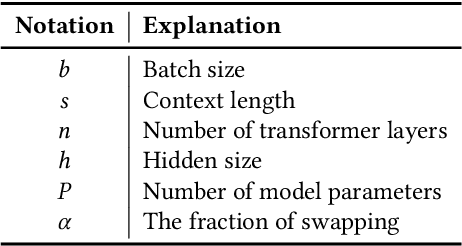
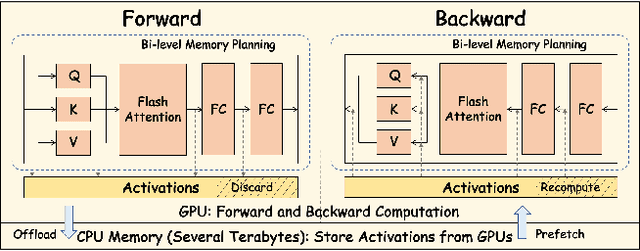
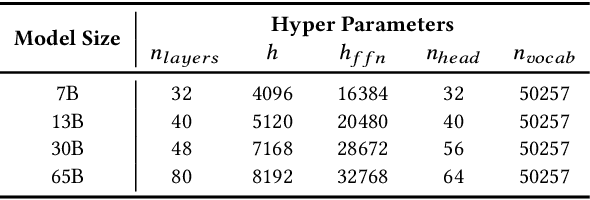
Abstract:Nowadays, Large Language Models (LLMs) have been trained using extended context lengths to foster more creative applications. However, long context training poses great challenges considering the constraint of GPU memory. It not only leads to substantial activation memory consumption during training, but also incurs considerable memory fragmentation. To facilitate long context training, existing frameworks have adopted strategies such as recomputation and various forms of parallelisms. Nevertheless, these techniques rely on redundant computation or extensive communication, resulting in low Model FLOPS Utilization (MFU). In this paper, we propose MEMO, a novel LLM training framework designed for fine-grained activation memory management. Given the quadratic scaling of computation and linear scaling of memory with sequence lengths when using FlashAttention, we offload memory-consuming activations to CPU memory after each layer's forward pass and fetch them during the backward pass. To maximize the swapping of activations without hindering computation, and to avoid exhausting limited CPU memory, we implement a token-wise activation recomputation and swapping mechanism. Furthermore, we tackle the memory fragmentation issue by employing a bi-level Mixed Integer Programming (MIP) approach, optimizing the reuse of memory across transformer layers. Empirical results demonstrate that MEMO achieves an average of 2.42x and 2.26x MFU compared to Megatron-LM and DeepSpeed, respectively. This improvement is attributed to MEMO's ability to minimize memory fragmentation, reduce recomputation and intensive communication, and circumvent the delays associated with the memory reorganization process due to fragmentation. By leveraging fine-grained activation memory management, MEMO facilitates efficient training of 7B LLM with 1 million sequence length on just 8 A800 GPUs, achieving an MFU of 52.30%.
 Add to Chrome
Add to Chrome Add to Firefox
Add to Firefox Add to Edge
Add to Edge